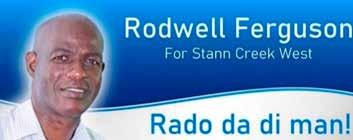
12 minute read
Anthony Mahler Tourism & Diaspora Relations
breathed a collective sigh of relief. It is time to look forward to a new day. I express my most sincere gratitude to all of you who voted today. See you tomorrow. God bless.
Dolores Balderamos Garcia, Belize Rural Central
Advertisement
and supported us for this big change that’s about to happen .
Thanks to the committee for all the hard work put into this election and thanks to the election and boundaries officers for coming out here amidst of the Covid 19 pandemic to allow all voters the right to exercise their right to vote . People, you made a great choice for Belize to be a better country. With that said remember that all a we fih win , PUP , UDP , any P!


Louis Zabaneh, Dangriga
Thank you my wonderful people of Dangriga, Hope Creek, and Sarawee! A big thank you to our leadership team and all who supported us in various ways. We did this together! We thank Almighty God for looking over us and for a peaceful election. We will continue to work together for the benefit of everyone in our Constituency. I humbly accept your approval of my application for this honorable job and I pledge to serve you all to the best of my ability. May God bless us all and May He guide and protect us as we endeavor to make the lives of our people better. Together We Change! God bless!
Julius Espat, Cayo South
Thank you to all voters in Cayo South who voted today, and are giving me the opportunity to serve them for the next five years. Here to serve!
Thank you for the overwhelming support we received from the voters of Cayo South
Final results:
Julius 4063
Witz. 1118
A difference of 2,945 votes
I will work diligently to bring back accountability to this country with your participation.

Alex Balona, Cayo Central
I, Alex Balona, thank every voter of Cayo Central who believed that we deserve Real Change in Cayo Central and entrusted your vote in me. God bless you all as I am committed to serving you for the next five years!
Oscar Mira, Belmopan
MY FELLOW RESIDENTS OF BELMOPAN.
This is your victory. Thank you for your support and I am humbled by the tremendous trust you have placed in me. I am fully cognizant of the responsibility that has been placed on my shoulders. The work of the new PUP government will not be easy. We are inheriting a broken economy and a community ravaged by Covid 19. This work will not be easy but together, with boundless hope and unbreakable determination that too we shall overcome.
For 12 years we have suffered tremendous pressure under the corruption of the UDP but today our beloved country has

Dear voters of Belize Rural Central, A huge and heartfelt thank you to everyone who voted yesterday, whether for pink, green, red or blue !! You have given a resounding mandate for me and the Government of the PUP to put our shoulders to the wheel for a better Belize.
I will do my very best to represent EVERYONE !! My wish is for God’s abundant blessings as we confront difficult times. The people of BRC are resilient and we will prevail to build a Belize that works for EVERYONE !!!
Henry Usher, Fort George
My Fort George family, I am truly humbled at the opportunity you have given me to serve you, the residents of Fort George. “During the hardest times, we know how fu win,” and voters came out in unprecedented numbers and delivered a massive victory for the PUP in Fort George!
I could not have done it alone, and I would like to take this opportunity to thank my wife and children for standing by me and supporting me through it all!
I would like to thank my mother, Lenijo, a living legend and an Election Day General. Thank you Mom, for every gentle word, every generous act, and every unselfish deed. You have always believed in me. Thank you for teaching me to serve the people, and for being a pillar of compassion.
To the Rt. Hon. Said Musa , a political giant, a true servant of the people, a true representative of Fort George. Thank you for laying the foundation in Fort George. You have touched the lives of so many, and I give you my word to keep up the great work in the division.
Finally, to my Fort George Executive and Campaign team who worked tirelessly, Sunday to Sunday to deliver this victory. I could not have done it without you, and I owe this victory to you.
The people of Fort George have won. Great things are to come in the division. I am ready for the tasks that lie ahead and I will not let you down! -HCU

Ramon ‘Monchi’ Cervantes, Orange Walk North

20 THE BELIZE TIMES 22 NOV 2020 Fast tests for covid-19 are coming…They will help, until a vaccine can be deployed
By The Economist (November 14, 2020)
AS NEWS EMERGED this week that an experimental vaccine against covid-19 has proved effective in latestage clinical trials, hopes that the pandemic’s days may be numbered are running high (see article in the Economist). But, even with the best of luck, it will be months before a vaccine starts to make a difference on the ground in those countries that get the first supplies of it, let alone the ones at the back of the queue. In the meantime, the pandemic juggernaut rolls on.
To try to slow it, many countries are starting to deploy tests which, at some cost in accuracy, deliver their results much more rapidly than the polymerase-chain-reaction (PCR) tests that were commonplace at the pandemic’s beginning. These rapid tests will allow greater numbers of infected people than previously possible to be detected and quarantined before they can spread the contagion. They are therefore being used in increasing numbers to screen people for the presence of SARS-CoV-2, the virus that causes covid-19, in settings ranging from airports to nursing homes. In Europe, indeed, they are sometimes used to blitz entire neighbourhoods, cities and even small countries, like Slovakia. But will they change the course of the pandemic?
Smaller, faster, cheaper
PCR tests look for the genetic sequence of the virus in nose and throat swabs. These swabs have to be processed in laboratories and require machines that take hours to come up with a result. They are extremely accurate. But the delay involved can hobble test-and-trace systems.
Rapid tests, by contrast, are designed to detect certain proteins that SARS-CoV-2 sheds when it replicates during an infection. These proteins, known as antigens, spur the immune system into making other proteins, called antibodies, that go on to disable the virus. Antigen tests need no laboratory backup and can report a result in 15-20 minutes. They work by dipping the swab into a vial containing a solution that extracts the antigen of interest. A few drops of the mix are then applied to a test strip laced with antibodies that recognise that antigen. The test strip displays the results like a home pregnancy test.
The speed with which these tests have been developed is impressive. More than 70 are now on the market in one part of the world or another, according to a catalogue compiled by the Foundation for Innovative New Diagnostics (FIND), a charity in Geneva that supports the World Health Organisation (WHO) with research on diagnostic tools. So far, only two of them have been granted provisional (“emergency use”) approval by the WHO, and seven by America’s federal regulator, the Food and Drug Administration. But more approvals are expected to be forthcoming in the weeks ahead as FIND and other organisations complete validation studies that test the tests in the real-life conditions in which they are likely to be used.
Early antigen tests were not terribly good, but many of the newer ones are extremely accurate. If a PCR test is negative, a modern antigen test on the same individual will agree with that analysis more than 97% of the time, a value called its specificity. The story gets complicated, though, when the virus is actually around. If someone tests positive for covid-19 in a PCR test, the best antigen tests will agree in more than 90% of cases if the testing is happening within a week or so of the onset of symptoms, a value called the sensitivity. But the rate of agreement falls if the antigen test is done at the beginning or end of an infection, when the amount of virus present in the nose and throat is considerably lower. This means that diagnoses relying on antigen tests are unreliable during those periods.
Fortunately, from a public-health point of view this may not matter. The relationship between viral load and contagiousness is not fully understood, but current thinking is that higher loads make people more contagious. Since those with higher loads are most likely to show up as positive in an antigen test and therefore be asked to isolate themselves, the transmission-breaking value of the new tests should not be too badly compromised.
In theory, then, all of this sounds great. But reality is messier. Even a highly accurate test will produce fewer true positives than false positives if the people being tested are unlikely to be infected in the first place (see chart). That would be the kind of problem which arises with mass testing in places that are not covid-19 hotspots. For example, Britain’s Office for National Statistics estimates that on October 28th 0.82% of people in private households in London were infected. If everyone in London that day was given a test that has the minimum “acceptable” accuracy for rapid tests set by the WHO (80% sensitivity and 97% specificity) the number of those with false-positive results will be 353% bigger than those with true positive results.
This is why deciding whether to

trust the result of an imperfect rapid test—or, indeed, whether it is worth using the test at all—depends on who is being tested, and why. A positive result is more credible for someone with symptoms, or who is a close contact of an infected individual, and perhaps lives in an area with a high covid-19 rate. But testing people when there is no obvious reason to believe they may be infected is likely to be a waste. A positive result in that case will be suspect.
Do try this at home
Doctors are used to making such decisions when testing for things like cancer, sexually transmitted infections and so on. The guidelines they employ draw on years of research and practice. But for covid-19 things are new and changing rapidly. To deal with that, some test developers are pairing their products with “digital wraparounds” such as apps in which such decision-making algorithms are fed up-to-date data on things like trends in local covid-19 prevalence and the weight of various personal risk factors derived from various analyses. Some of these apps issue a time-limited bar code to those who test negative, for use where proof of a negative test may be required.
For now, rapid tests are licensed for use only by medical professionals. The regulatory bar for stand-alone home tests is set high. They must be 99% accurate and pass extensive usability trials to ensure that people employ them correctly. That would be easier if the secretion being tested was saliva, which is freely accessible, rather than material found high in the nose or deep in the throat. Saliva does work reliably in some PCR tests but no one has yet devised a good antigen test that uses it.
At the current pace of progress, though, this may soon change. Bruce Tromberg of America’s National Institutes of Health (NIH) thinks that a rapid over-the-counter test could be available in America as early as next summer. Rapid antigen tests are, then, likely to become a big part of countries’ covid-19 testing strategies. In particular, they will be used for testing at home, in doctors’ surgeries, and in remote places where PCR laboratories are not available. They will be especially handy for mass testing in places prone to outbreaks, such

as prisons and student dormitories.
As more rapid tests are developed and demand for them increases, competition and manufacturing at scale will make them cheaper. Stand-alone antigen tests are now available for as little as $5 apiece, but prices may eventually drop nearer to $1, which is the cost of a rapid test for malaria. Tests that use small machines are about $10-20 each, plus a few hundred dollars for the device. A PCR test now costs around $50, but will be cheaper for automated largescale testing of samples that come in bulk on a set schedule, such as samples from universities or workplaces.
Even though antigen tests are cheap, however, some people worry that rich countries will corner the market for them until production has ramped up sufficiently, leaving poorer places with a shortage. To avoid this, the Bill and Melinda Gates Foundation, a big charity, has teamed up with the WHO to place an order for 120m rapid tests which will go to 133 developing countries over the next six months.
Dr Tromberg, who leads a project at the NIH which invests in new covid-19 testing technologies that can be scaled up rapidly to mass production, reckons the 22 products in his pipeline which are already at the manufacturing stage will add 2.5m tests a day by the end of this year—helping raise America’s total to 6m-7m. Around the world, several makers of rapid covid-19 tests have said they have the capacity to make tests in the tens or hundreds of millions a year. This sounds plausible, given that 400m malaria test kits are made each year. But expanding into the billions is terra incognita. Though new production lines can be built and existing ones put to work around the clock, making tests requires skilled workers, who are in limited supply.
Whether rapid tests change the course of the pandemic and end the need for lockdowns until a vaccine can likewise be made and distributed at scale will depend on whether those which are available are used wisely. Eventually, such a vaccine will reduce the demand for tests dramatically. But, for now, the world needs them.







